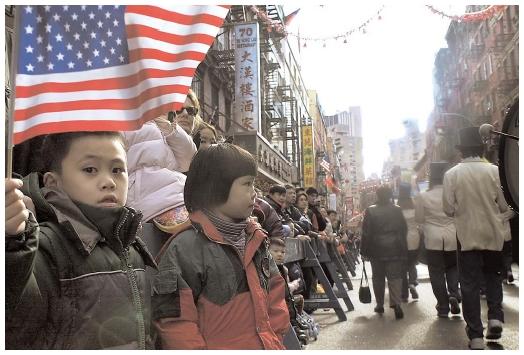
As I have discussed in an earlier post, I feel like I fit the fortune cookie analogy: yellow on the outside but both yellow and white on the inside. I am Asian American. I was, however, born in China so I did experience my fair share of being an immigrant. Being a Chinese, an immigrant, and an American, I am very interested in where these fine lines of separation lie and what turning markers blur these lines. When does an Asian immigrant become an Asian American?
Do Asians become Asian-Americans when they naturalize or does the transformation occur sooner, e.g. when they learn to combat Asian American issues, take on American values and standards, or become proficient in speaking English? By extension of the latter theory, do immigrants from English-speaking countries become Americans sooner than those who do not? If we hypothesize that becoming American relies not simply within a legal document, how can we hash out the traits that separate Asian from Asian American?
One can make the argument that Asian Americans are perpetually foreign in the United States (Sue: "Racial Microaggression"). They originate from lands where the languages and customs are vastly different from Western society's. Asian immigrants continue to roll in abundance to the United States, as well as countries all over the world yet they all share one commonality in their physical phenotypes: faces that irrevocably distinguish us as members of a minority race with recent origins in perpetually foreign countries. This physical identification factor may explain why many Asians believe that they neither have the ability nor the incentive to assimilate like European groups. When asked where they are from, Asian Americans would naturally reply "Boston," "New York" or another American location but unsatisfactorily to the inquisitor: "Where are you really from?" Despite this extra layer of assimilation barrier, many Asians have boldly tried to identify themselves as Asian American, for example, writer Ha Jin and musician Yo-Yo Ma.
Despite wanting to assimilate, wanting not to become a foreigner in our own country, Asian Americans themselves have blurred the lines between Asian Americans and Asians. Many members of the Asian American community, for example, have embraced famous Asians like Jackie Chan and Jet Li as their own. While these Asian celebrities may help publicize the Asian American community, they also reinforce the Asian stereotypes that Asian Americans generally do not want to be associated with: broken English, traditional Asian values, etc. What do Asian Americans want to be seen as? As someone who considers herself Asian American, I, too, will embrace stars like Jackie Chan as people who help elevate my "race" and bring it to public discourse. These people characterize the "Asian" in "Asian American" and their talents, values, and characteristics represent positively for all Asians and Asian Americans. However, I will be quick to identify other celebrities like Amy Tan or Michelle Kwan as well, individuals who are born in the U.S. or who have lived here for a number of years. These stars fully encompass Asian Americanism in their experiences with conflicting cultural values and generational divides, experiences that Asian Americans face (Cross' "Racial Identity Development Model").
I consider myself both Asian and American, hence Asian American. However, my parents generally see themselves as more Asian than American. We are all U.S. citizens and have been in America for the same number of years. However, I feel more emotionally tied to America; I have a heart-to-heart commitment to America that my parents lack. Emotional commitment sounds like a vague standard, but I think it is the best explanation for why some immigrants will never truly feel American despite temporal and locational associations. For example, individuals who moved to America against their will, like refugees, are not going to feel a sense of commitment to their new land. No matter how long they spend in America, they see America as a place of displacement and their native country as their true home. Being emotionally committed to a country is really open to interpretation. Once must feel a senses of national pride, of course, but I feel like the individual should also make a serious effort to learn the language (English), participate in civil society (e.g. vote or take on activism projects), associate with diverse people in America, carry appropriate emotions in national times of crises and triumphs, and feel a need to give back to America because it has afforded the individual certain rights and privileges. Because of all these malleable requirements, I feel more Asian American and my parents, more Asian.
What the individual thinks and what society thinks of the individual are often two very disparate notions but they definitely influence each other. When one starts to feel American and thinks he/she is American, then society will reciprocate these affections. Into the melting pot I go!

No comments:
Post a Comment